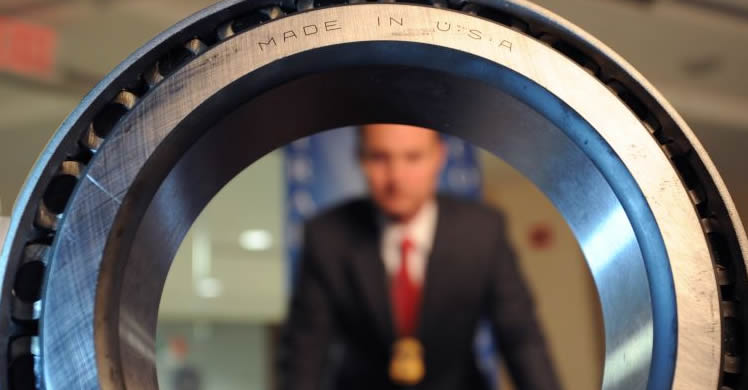Archived Content
In an effort to keep ICE.gov current, the archive contains content from a previous administration or is otherwise outdated. This information is archived and not reflective of current practice.
IPR Center celebrates tenth anniversary on World IP Day
WASHINGTON – U.S. Immigration and Customs Enforcement’s (ICE) Homeland Security Investigations (HSI), U.S. Customs and Border Protection (CBP), FBI and other partner agencies with the National Intellectual Property Rights Coordination Center (IPR Center) renewed their fight today against counterfeiting and IP theft that threaten the safety of American consumers, levy negative impacts on the U.S. economy and fund transnational criminal organizations, during at an event recognizing the center’s tenth anniversary.
Intellectual property enforcers from across federal law-enforcement gathered at the ICE-led IPR Center in Arlington, Virginia, on World IP Day to review 10-years of successful investigative highlights, and industry representatives associated with the automotive, pharmaceutical, fashion and technology sectors expressed thanks to agents for cracking down on the illegal importation and distribution of counterfeit goods that could introduce vulnerabilities into the American supply chain.
“The IPR Center not only stands at the forefront of the federal government’s response to counterfeiting, but also epitomizes ICE’s commitment to dedicate resources in the fight against IP crimes,” said HSI Acting Executive Associate Director Derek Benner. “HSI special agents in collaboration with law-enforcement partners and industry representatives will continue to aggressively investigate IP theft and refer cases for prosecution.”
As part of today’s anniversary event, IPR Center Director Alex Khu signed a declaration of intent to support the International Chamber of Commerce’s (ICC) Business Action to Stop Counterfeiting and Piracy, and expressed strong commitment to prevent the maritime transport of counterfeit goods. ICC launched this effort, which has been signed by shipping companies and freight forwarders and multinational brand owners, in 2016 to address the issue of counterfeit goods being transported through shipping containers. The IPR Center is the first law-enforcement organization to formally pledge support of this initiative.
The IP enforcement center has shown steadfast dedication in its collaboration with industry, non-profit organizations and law enforcement dedicated to fighting the trafficking of counterfeit, substandard and tainted goods. This ongoing relationship has been a major factor in conducting effective enforcement at ports, mailing facilities and during investigations. The agency continues to strengthen joint efforts with public and private sectors through an operation called Joint Venture.
Operation Joint Venture targets rights holders, manufacturers, importers, customs brokers, freight forwarders, bonded facilities, carriers and others to discuss the IPR Center’s priorities of eliminating health and safety hazards, protecting the American economy and securing the U.S. government’s supply chain. Industry representatives have been a key part of national IP enforcement operations, and their efforts have resulted in the removal of several thousand copyright-infringing websites and erroneous social media and ecommerce listings.
“Over the last ten years, the IPR Center’s initiatives have helped safeguard American intellectual property and spur American creativity and innovation,” said David Hirschmann, president and CEO of the Global Innovation Policy Center. “The Center has protected countless Americans from dangerous IP crimes. Whether they’re seizing hazardous counterfeit medicines, disabling dangerous fake airbags, or investigating the complex criminal networks behind illicit trade, IPR Center agents are always hard at work. We commend all the IPR Center does behalf of innovators, creators, and consumers across the country.”
Ten years has seen the IPR Center launch seven different ongoing IP enforcement operations targeting various commodities that could threaten the safety of American consumers. Operations focusing on counterfeit pharmaceuticals, healthcare products, consumer technology and other items are developed after collaborative efforts between public and private sectors reveal counterfeiting issues that may need both immediate and long-term attention. For example, the automotive industry approached the agency in 2009 about the illicit importation and sale of counterfeit airbags, and the IPR Center mobilized to issue a public service announcement about the dangers of fake automotive parts.
Intellectual property enforcement initiatives developed by the IPR Center include major participation from HSI, CBP, Food and Drug Administration, military law-enforcement agencies and international authorities. In fiscal year 2017, HSI arrested 457 individuals, obtained 288 indictments and received 242 convictions related to support of IP enforcement operations. Additionally, combined efforts between ICE and CBP led to 34,143 IPR seizures with a value of $1.38 billion.
The IPR Center is also home to the Commercial Fraud Program, a joint HSI-CBP investigative discipline that leverages lessons learned from IP enforcement to better inform the other trade enforcement priorities of the IPR Center, including anti-dumping/countervailing duties, in-bond, textiles, tobacco, health and safety and wildlife enforcement. “Each of these priority areas has unique but overlapping enforcement challenges that can be better addressed with the collective thought, identification of best practices, and comprehensive approach taken by the Commercial Fraud Program,” said Executive Assistant Commissioner Brenda B. Smith of CBP’s Office of Trade.
The IPR Center – formally codified in the Trade Facilitation and Trade Enforcement Act of 2015 – is one of the U.S. government's key weapons in the fight against criminal counterfeiting and piracy. The center uses the expertise of its 23 member agencies to share information, develop initiatives, coordinate enforcement actions, and conduct investigations related to IP theft. Through this strategic interagency partnership, the IPR Center protects the public's health and safety, the U.S. economy and the war fighters.


